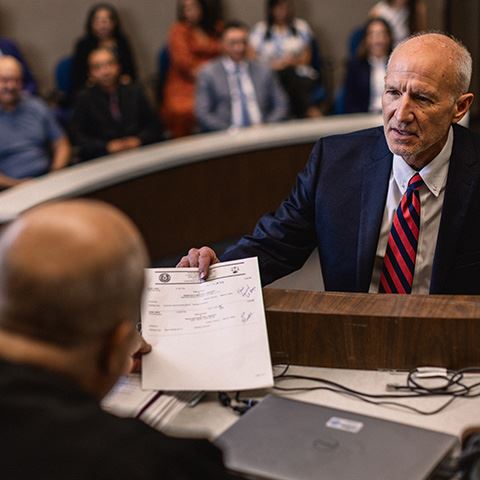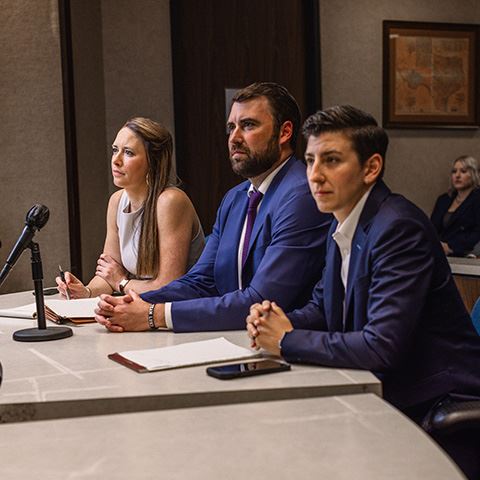Corpus Christi Whistleblower Attorneys
Fighting for Whistleblowers in Corpus Christi, TX

It takes an extraordinary amount of courage to stand against your employer's misconduct and blow the whistle. Such a decision is not without its challenges, as it often means risking one's career, livelihood, and sometimes, personal and professional reputation. Yet, it is these brave individuals who ensure that justice prevails by shedding light on illicit practices, corporate fraud, and other forms of wrongdoing.
If you recently blew the whistle on your employer and are now facing any form of retaliation, Hilliard Law is ready to fight to enforce your rights. We understand the difficult road ahead, and our experienced Corpus Christi whistleblower lawyers are prepared to ensure that any retaliatory action is met with the full force of the law. You can rest assured we understand how to successfully navigate the complexities of these cases and will leverage the full extent of our resources to protect your interests.
You deserve capable legal advocates when you are brave enough to blow the whistle.
Schedule an initial consultation by calling (866) 927-3420 or contacting us online.
What Makes Someone a Whistleblower?
Anyone can become a whistleblower. It's a role that transcends job titles, industries, and organizational hierarchies. It can be assumed by anyone who witnesses and decides to expose unlawful or unethical activities within an organization, be it a CEO, a manager, or a frontline employee. The act of whistleblowing stems from a commitment to integrity and an uncompromising belief in transparency and accountability.
Numerous types of misconduct and wrongdoing that can necessitate whistleblowing, which include (but are not limited to):
- Fraudulent financial reporting. This is one of the most damaging forms of misconduct because it can harm not just the company but also its investors, employees, and the broader market. Fraudulent financial reporting can involve inflating revenue, understatement of expenses, misrepresentation of financial health, and other forms of deceptive financial practices.
- Bribery and corruption. Corruption can take many forms. It often involves the abuse of entrusted power for private gain.
- Health and safety violations. These types of violations could endanger the lives and well-being of employees and the public. They can range from ignoring proper safety protocols to deliberately concealing health hazards.
- Legal and regulatory non-compliance. Companies are required to comply with a multitude of laws and regulations. Non-compliance, whether intentional or due to negligence, can lead to severe harm if not addressed.
- Environmental violations. These infractions typically involve the illegal disposal of hazardous waste, violation of emission standards, or practices that harm natural resources. It's crucial for potential whistleblowers to report these violations, given their far-reaching implications for public health and the environment.
Not every disclosure of wrongdoing qualifies as whistleblowing. Whistleblower protection laws typically apply only when the reported misconduct involves a violation of a specific law, rule, or regulation. Voicing even well-founded complaints about general working conditions or individual personnel matters might not necessarily fall under the purview of whistleblowing. Therefore, potential whistleblowers must understand the legal implications of their actions and ensure their claims fall under protected conduct. That is why we generally urge you to get legal advice before you report misconduct in any capacity.
Additionally, the ability to become a whistleblower also depends on your access to information. You must be in a position where you have firsthand knowledge or a reasonable suspicion of misconduct. This means that you have witnessed the illicit activities yourself or the information you have strongly indicates violation or misconduct is taking place.
Confronting organizational wrongdoings can be an uphill battle, requiring one to stand up against powerful entities. Our Corpus Christi whistleblower attorneys commend and are prepared to support you if you take on this role. We will fight to ensure that your courageous voice is heard and that your rights are aggressively protected.
Types of Unlawful Whistleblower Retaliation
Retaliation against whistleblowers is unfortunately common, and it can manifest in various ways. We understand that standing up for justice is no easy task, but with the right legal support, you can blow the whistle with confidence, knowing that your courage and integrity are matched by our unwavering commitment to your protection.
Our Corpus Christi whistleblower lawyers are prepared to represent you if you suffered any form of retaliation after reporting misconduct, including:
- Termination or demotion. One of the most blatant forms of retaliation is the termination of employment. A whistleblower might also face demotion, where their role and responsibilities are significantly reduced, often without a valid reason.
- Creation of a hostile work environment. This can include an increase in scrutiny, isolation from colleagues, or deliberate exclusion from meetings or other workplace activities. The objective is often to make the work environment so unbearable that the whistleblower is forced to resign.
- Denial of promotions or raises. A whistleblower might be overlooked for promotions or denied raises they deserve. This form of retaliation is not as visible as others but can significantly impact a whistleblower's career progression and financial prospects.
- Harassment or intimidation. This could include verbal or physical abuse, threats, or any other form of harassment aimed at the whistleblower.
- Defamation. In some cases, employers might resort to damaging a whistleblower's reputation, either within the industry or publicly. This can drastically affect their employability and career prospects in the future.
- Legal action. Some employers might even take legal action against whistleblowers, often on dubious grounds, in an attempt to intimidate them or tie them up in costly, protracted legal battles.
No one should suffer for standing up for what's right, and our Corpus Christi whistleblower attorneys are ready to fight tirelessly to ensure that justice is served.
Call (866) 927-3420 or contact us online today.



Real Results ReaL Justice
-
Record-Setting$575Wrongful Death
Million Settlement*Hilliard Law attorneys represented numerous injury victims and the families of those killed in accidents caused by GM’s defective ignition switch and their concealment of safety defects.
-
$310Wrongful Death
Million VerdictHilliard Law attorneys secured a $310 million verdict against “Funtime” Handelsgesellschaft M.G.H., the manufacturer of the defective Orlando FreeFall attraction at ICON Park, for the family of Tyre Sampson.
-
$50Class Action
Million Settlement*Mr. Hilliard was the lead class counsel in Haese v. H&R Block, a class action lawsuit involving every Texan who received a rapid refund from H&R Block (approx. 300,000 plaintiffs). He assisted other class counsel in forcing H&R Block to disclose it received kickbacks for arranging loans between its tax preparation clients and predatory lenders.
-
$50Wrongful Death
Million SettlementIn September 2021, Hilliard Law attorneys secured a $50 Million settlement for the family of a man who died in a commercial trucking accident.
-
$33Traumatic Brain Injury
Million VerdictThe Hilliard Law trial team won a $33M product liability case against a golf-car company, involving a golf cart that tipped over on a child causing a severe traumatic brain injury.
-
$33Work Injury
Million AwardWith the representation of Hilliard Law, two delivery drivers who were shot while completing a delivery were awarded $33 million through an arbitration panel.
Can a Whistleblower Remain Anonymous in Texas?
With so much at stake, you may be understandably wondering if it is possible to maintain anonymity when reporting misconduct or wrongdoing. At Hilliard Law, we recognize the importance of anonymity and will do everything possible to ensure your identity remains undisclosed whenever possible.
However, you must be aware that the degree of anonymity can vary depending on the specifics of the case and the jurisdiction. Under some whistleblower laws, such as the False Claims Act, your identity may eventually become public due to the legal processes involved. In other instances, it may be possible to preserve anonymity if the right steps are taken.
While many companies claim to have their own whistleblower protocols, blowing the whistle internally may not always be the best course of action, especially if are you hoping to remain anonymous. These internal channels are established by the very entity you might be reporting, which can present a conflict of interest. Despite assurances of confidentiality and non-retaliation, there may still be a risk of internal bias, intentional or otherwise, during the investigation process. Plus, depending on the nature of your allegations, your employer may not be legally obligated to act upon your report or protect your rights as a whistleblower, particularly if you haven't reported the wrongdoing to an appropriate law enforcement or regulatory agency. In cases of widespread or top-level misconduct, internal reporting might prove ineffective, as it could be dismissed, overlooked, or even covered up by those attempting to protect the company's interest at the expense of accountability and transparency.
Legal Remedies for Whistleblower Retaliation
Whistleblower retaliation is a serious violation of the law, and those who experience it are entitled to various legal remedies. We are committed to pursuing all available legal remedies on behalf of our clients to rectify the harm caused by retaliation.
The specific remedies available can vary depending on the applicable whistleblower protection law but can generally include:
- Reinstatement. If you were unjustly fired after blowing the whistle, you may be able to get your job back. This remedy is designed to restore you to the position you would have been in if not for the retaliation.
- Back pay. You can receive compensation for lost wages resulting from wrongful termination or demotion. This includes any money that you would have earned had the retaliation not occurred.
- Front pay. In cases where reinstatement isn't viable, you may instead be entitled to front pay, which compensates for future lost earnings.
- Compensatory damages. You may receive compensation for any out-of-pocket expenses, emotional distress, or reputational damage that resulted from the retaliation.
- Punitive damages. In cases where the retaliation was particularly egregious, you could be awarded punitive damages. These are intended to punish the perpetrator and deter similar behavior in the future.
- Attorneys' fees and court costs. Many whistleblower protection laws allow successful whistleblowers to recover legal fees and court costs, thus ensuring access to justice regardless of personal financial resources.



It’s our mission to hold the powerful accountable for their wrongdoing. Reach out to our team immediately regarding your case to schedule a free attorney consultation today.


